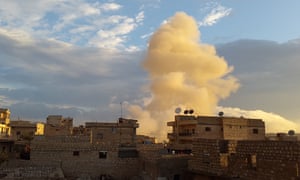Proxies In Conflict
"Five hundred TOWs is not an inconsequential number."
"I don't think it will be a revolutionary event, but it will increase the attrition of regime armor, which will make it harder for the regime to conduct offensive operations."
"If the TOWs are primarily used against Assad armor, that's not the same as being used against Russian personnel. If the Saudis were to supply the rebels with surface-to-air missiles, that would be different."
"If this ['tank massacres'] continues, expect to see the [Syrian] regime move away from using armor and start using higher firepower and air operations as a solution."
Jeffrey White, defense fellow, The Washington Institute
"They [United States and Saudi Arabia] pledged to continue and intensify support to the moderate Syrian opposition while the political track is being pursued."
US. State Department
"[Rebel forces armed] with US-made TOW missiles … [and] other guided rockets ... caused the destruction … of over 15 armored cars, vehicles, and [Syrian regime] tanks."
Syrian Observatory of Human Rights, London
| social media / screenshot |
Saudi Arabia, Qatar and Turkey reeled back in a temporarily-induced setback with the incursion of Russian bombing missions over Syria by air and by sea, but the United States and Saudi Arabia have reached an agreement in a joint response to the Assad regime receiving firm support in Russian air strikes. Vladimir Putin's invitation for them to join a unified front against Islamic State has been spurned for obvious reasons, the most pressing being that Moscow hasn't much targeted ISIL, reserving the lion's share of their attention for the rebel groups.
In turn, the traditional allies in the Middle East have agreed to increase military and diplomatic support for the Syrian Free Army. Moscow's assurance that it has extracted fresh election promises from President Assad was seen as somewhat less than persuasive by the duo who decided to respond by re-affirming their support for the rebel groups' determination to remove their tyrant by the force that is required to reach success.
Which effectively pits Washington against Moscow in no uncertain manner. The nine-fold increase of U.S.-produced TOW missiles has hampered the regime's offensives, even with the air firepower, the Hezbollah aid, and the battlefield manoeuvring advice courtesy of al Quds, let alone the newly observed presence of both Iranian and Russian soldiers on the ground alongside those of the regime's.
 |
| Air strikes launched by the Russian regime in the province of Aleppo. Photograph: Alaa Abdulrahman/PA Images |
The U.S.-Saudi support for the rebels had historically marked the death-knell both of the Russian invasion success of Afghanistan, and the eventual dissolution of the Soviet Union, a fact of commission that has hardly been lost in the fog of time for Vladimir Putin, who mourns the passing of the USSR's power and prestige as one of two super-powers, a status that the President of Russia is eager to reclaim.
An end to the fighting isn't seen in sight in the near future. Understandably, given the violence of the regime response to Syrian Sunni demands for equality in their country, the rebels are none too eager to treat Bashar al-Assad as a simple adversary toward whom reasonable accommodation could be made, transforming him from a monstrous slaughterer of his own, to a respectable former head of state who can quietly depart the scene, leaving Syria writhing in its death throes.
No possible agreement to halt the conflict could restore the quarter-million lives taken as a result of the Alawite regime's refusal to negotiate when the Sunnis first protested peacefully. The ongoing savagery of the regime's vengeance against its Sunni population has created four million refugees clamouring for haven in Europe, and another seven million internally displaced, suffering the vagaries of conflict-induced hardships.
Regime troops have made some vital gains against the rebels around Aleppo where the fighting has been most fierce, thanks to the help of Russian jets, Iranian ground troops and Shiite militias who have responded to the Iranian appeal for fighters to join their sectarian cause alongside the Lebanese Hezbollah.
ISIL, meanwhile, continues to flourish in its slower, but still effective spread on the northern and southern fringes of Aleppo, while Jabhat al-Nusra has taken control of local strategic operations. The benefit to ISIL of the Russian intervention, forcing the Syrian Free Army militias to focus away from ISIL and al-Qaeda in self-defence has left them free to expand their horizons, though at some future date their competition for those horizons may lead them to a deadly confrontation in this most complex of Middle East lapse back to barbarity.
Labels: Conflict, Hezbollah, Iran, Munitions, Rebels, Russia, Saudi Arabia, Syria, United States
0 Comments:
Post a Comment
<< Home